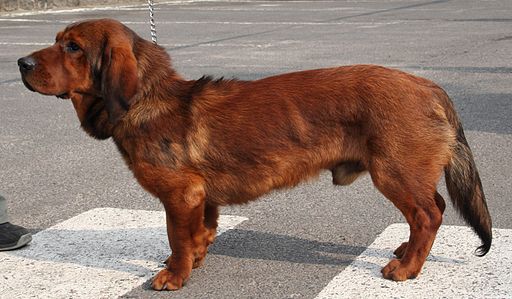Dog Day Saturday 2023-04-08
Owning and interacting with pets, according to studies, can be a form of therapy for many. We have dedicated Saturday to dogs and Wednesday to cats, when we will post an article on each of those days. We will also post articles on occasion about other animals people may have as pets. – Editorial Team
Alpine Dachsbracke
By D.Y.A.N.A Editorial Team

Pleple2000, CC BY-SA 3.0, via Wikimedia Commons
Introduction:
The Alpine Dachsbracke, also known as the Alpine Hound or Alpenländische Dachsbracke, is a medium-sized breed of dog that originated in Austria. It is a versatile hunting breed that has a keen sense of smell and a sturdy build, which allows it to hunt in the mountains.
History:
The Alpine Dachsbracke was developed in the early 20th century by crossing the Dachshund with various Austrian hounds, including the Styrian Hound and the Tyrolean Hound. The breed was developed specifically to hunt in the rugged mountain terrain of Austria, where it was used to track and hunt game such as hare, fox, and deer.
Appearance:
The Alpine Dachsbracke is a medium-sized dog that typically weighs between 30 and 40 pounds and stands around 12 to 15 inches tall at the shoulder. It has a short, dense coat that comes in various shades of red and black, with white markings on the chest, feet, and muzzle. The breed has a sturdy build, with strong legs and a deep chest, which allows it to navigate through the rocky terrain of the mountains.
Temperament:
The Alpine Dachsbracke is a friendly and outgoing breed that makes an excellent companion dog. It is loyal and affectionate to its family and is known for being good with children. However, due to its strong hunting instincts, it may not be suitable for households with small pets. The breed is also known for being independent and can be stubborn at times, which may require a firm and consistent approach to training.
Health:
Overall, the Alpine Dachsbracke is a healthy breed with a life expectancy of around 12 to 14 years. However, like all breeds, it is susceptible to certain health issues, including hip dysplasia, ear infections, and obesity. Regular exercise and a healthy diet can help prevent these health problems from occurring.
Conclusion:
The Alpine Dachsbracke is a versatile hunting breed that makes an excellent companion dog for the right family. It is friendly, loyal, and affectionate, but also has a strong independent streak that requires a firm and consistent approach to training. If you are looking for a dog that can keep up with you on outdoor adventures and be a loyal companion, the Alpine Dachsbracke may be the perfect breed for you.

